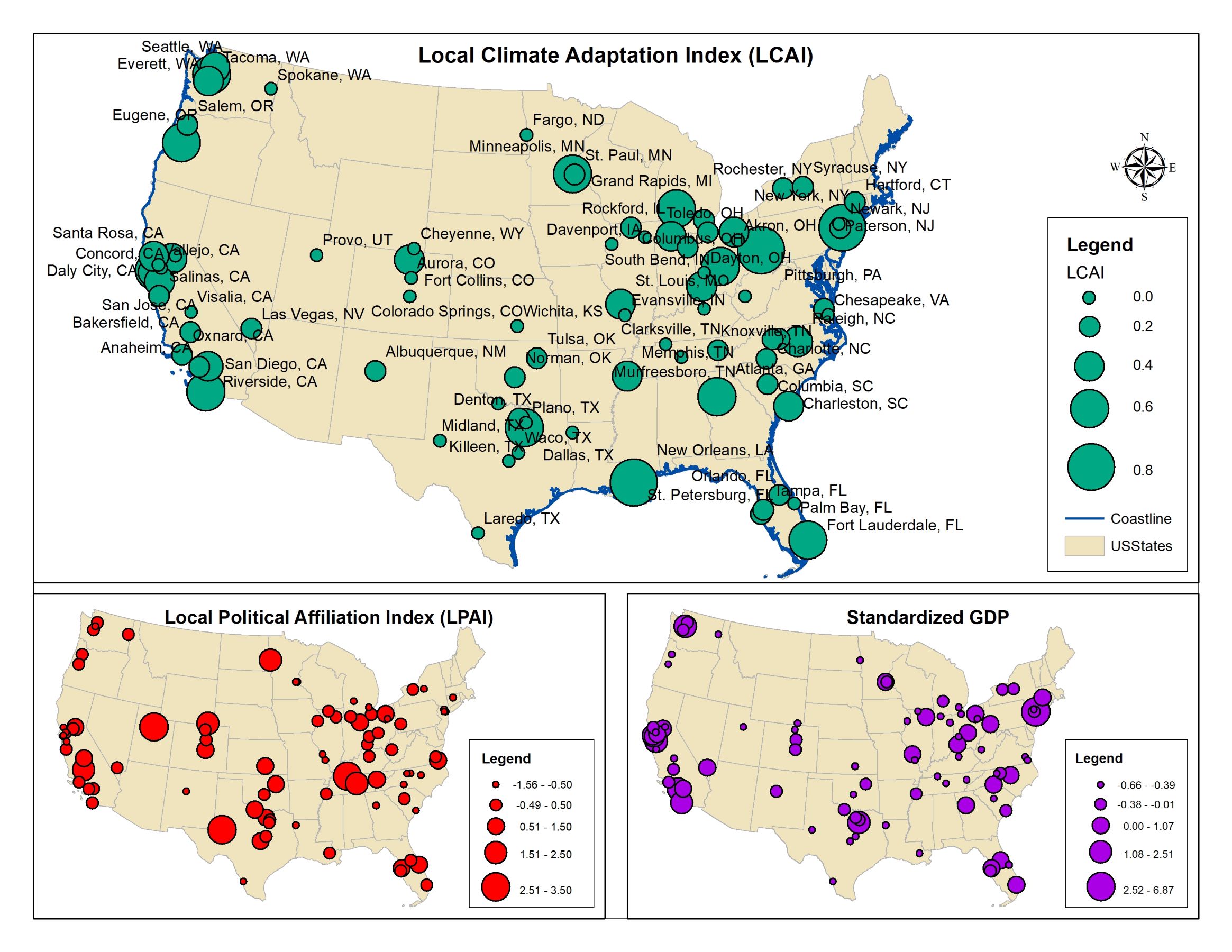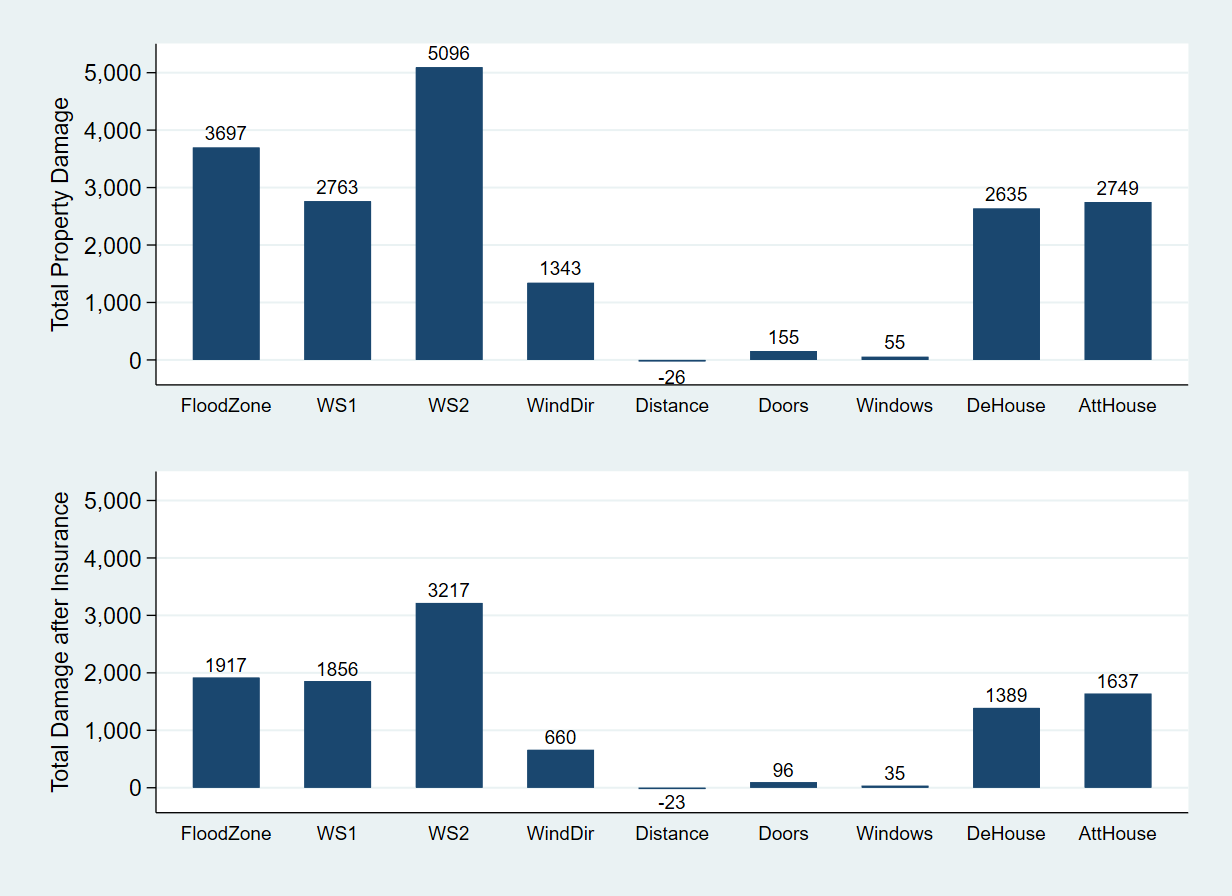Environmental Governance is Critical for Mitigating Human Displacement due to Weather-Related Disasters
Meng, S.* (2024). Environmental Governance is Critical for Mitigating Human Displacement due to Weather-Related Disasters. Communications Earth & Environment, 5: 363. https://doi.org/10.1038/s43247-024-01528-y

The impact of climate change is increasingly evident through intensified and more frequent weather-related events, resulting in a higher likelihood of disaster-induced displacement. In response, effective adaptation and resilience-building measures implemented through environmental governance are crucial. Here, we investigate the relationship between environmental governance (measured by the Notre Dame Country Index) and weather-related disaster displacements. Using a panel dataset of 92 countries from 2010 to 2020, Granger non-causality tests reveal a strong bidirectional relationship between environmental governance and disaster displacement. The relationship is primarily driven by governance readiness in the higher-income group, while both governance and economic readiness are crucial in the middle-income group. Notably, all three readiness components appear significant in the lower-income group, emphasizing the imperative for comprehensive disaster management strategies that address economic development, governmental effectiveness, and social conditions. These findings underscore the importance of effective environmental governance for climate change adaptation and sustainable development goals.
The Influences of Political Affiliation and Weather-Related Impacts on Climate Change Adaptation in U.S. Cities.
Gurney, RM., Meng, S., Rumschlag, S., & Hamlet, AF. (2022). The Influences of Political Affiliation and Weather-Related Impacts on Climate Change Adaptation in US Cities. Weather, Climate, and Society, 14(3):919-931. https://doi.org/10.1175/WCAS-D-21-0030.1
 This study examines the influences of state and local political affiliation and local exposure to weather-related impacts on local government climate change adaptation efforts in 88 U.S. cities. Although climate adaptation takes place when cities replace critical infrastructure damaged by severe weather events, little is known about the influence of political affiliation and severe weather events on climate adaptation in a broader sense. Using multiple linear regression models, this study analyzes variations in local government climate adaptation efforts as a function of local gross domestic product (as a control variable), historical weather-related factors [i.e., number of extreme weather events, weather-related economic impact due to property damage, and weather-related human impact (injuries and fatalities)], and state and local political affiliation. The findings of this study indicate that local political affiliation significantly influences local government climate adaptation efforts; however, state political affiliation does not. Further, local weather-related impacts do not appear to affect the likelihood of local government to engage in climate adaptation efforts, even when accounting for potential interactions with local political affiliation. These results support the hypothesis that local political affiliation is a strong and robust predictor of local climate adaptation in U.S. cities. This study contributes to literature aimed at addressing the widely acknowledged need for understanding key barriers to U.S. climate adaptation, as well as the role of politics in moderating climate action.
This study examines the influences of state and local political affiliation and local exposure to weather-related impacts on local government climate change adaptation efforts in 88 U.S. cities. Although climate adaptation takes place when cities replace critical infrastructure damaged by severe weather events, little is known about the influence of political affiliation and severe weather events on climate adaptation in a broader sense. Using multiple linear regression models, this study analyzes variations in local government climate adaptation efforts as a function of local gross domestic product (as a control variable), historical weather-related factors [i.e., number of extreme weather events, weather-related economic impact due to property damage, and weather-related human impact (injuries and fatalities)], and state and local political affiliation. The findings of this study indicate that local political affiliation significantly influences local government climate adaptation efforts; however, state political affiliation does not. Further, local weather-related impacts do not appear to affect the likelihood of local government to engage in climate adaptation efforts, even when accounting for potential interactions with local political affiliation. These results support the hypothesis that local political affiliation is a strong and robust predictor of local climate adaptation in U.S. cities. This study contributes to literature aimed at addressing the widely acknowledged need for understanding key barriers to U.S. climate adaptation, as well as the role of politics in moderating climate action.
Keywords Adaptation; Climate change; Regional effects; Societal impacts
A Spatial Econometric Analysis of Storm-induced Property Damage: Evidence from Hurricane Sandy
Preprint available at: https://ssrn.com/abstract=4531972

In this paper we examine property damages resulting from a major hurricane using a household survey conducted in areas affected by Hurricane Sandy. We employ spatial econometric tools to investigate the impact of hurricane and home structural characteristics on damages and associated spatial dependencies. To control for the intensity of hurricane and assess the hazard exposure on the property damage, we generate multiple hurricane intensity measures at the census-tract level using the HAZUS-MH analysis tool, which provides exogenous variation for the survey data analysis. Our analysis offers forensic evidence demonstrating that both the extent of hurricane exposure and structural vulnerability significantly contribute to property damages. Moreover, insurance coverage effectively mitigates losses for households affected by hurricanes. A better understanding of the underlying causes of the increasing disaster losses can provide individuals, policymakers, and insurance agencies with key insights to mitigate the risks of future hurricanes. We also emphasize the crucial need to address socio-economic vulnerability to enhance the effectiveness of disaster risk reduction strategies and promote resilience in coastal communities.
International Trade in the time of Natural Disasters and the COVID-19: A literature review
In recent years, more frequent and dangerous natural disasters have occurred all over the world due to climate change. In the meanwhile, the world is experiencing a global health disaster – the COVID-19 pandemic. The impacts of these disasters on the global economy, especially on international trade, has attracted widespread attention. Disasters can directly and indirectly affect trade. Therefore, understanding the relationship between trade and disasters not only facilitates countries to assess the degree of damage on trade and reduce economic losses when faced with disasters, but also provides rich experiences for countries to improve the prevention measures against future disasters. This paper reviews the existing literature from four perspectives, including 1) the mechanism through which natural disasters affect trade, 2) the impact of natural disasters on international trade at different levels, 3) the impact of climate change on international trade, 4) the impact of the COVID-19 on international trade. Then we point out the possible directions of further research based on the literature review.
INSTITUTIONS AND NATURAL DISASTERS: EVIDENCE FROM AGRICULTURAL TRADE IN CENTRAL AMERICA AND THE CARIBBEAN
 The main goal of the study is to investigate the impact of natural disasters on agricultural trade flows for 22 Central America and Caribbean countries. Specifically, it attempts to answer three questions: Do natural disasters have a significant impact on macroeconomic activities (agricultural imports and exports) over time? To what extent can the shocks affect these countries? Does the institutional quality matter for a country when dealing with disaster shocks? A panel regression model will be used to test the hypothesis, and the role of institutional quality in determining the trade flows will be examined by adding interaction terms to the estimation. This study contributes to the literature on the macroeconomic implications of natural catastrophes. It extends from the existing research by presenting a broader and more diverse sets of countries and by considering the importance of having good quality institutions.
The main goal of the study is to investigate the impact of natural disasters on agricultural trade flows for 22 Central America and Caribbean countries. Specifically, it attempts to answer three questions: Do natural disasters have a significant impact on macroeconomic activities (agricultural imports and exports) over time? To what extent can the shocks affect these countries? Does the institutional quality matter for a country when dealing with disaster shocks? A panel regression model will be used to test the hypothesis, and the role of institutional quality in determining the trade flows will be examined by adding interaction terms to the estimation. This study contributes to the literature on the macroeconomic implications of natural catastrophes. It extends from the existing research by presenting a broader and more diverse sets of countries and by considering the importance of having good quality institutions.